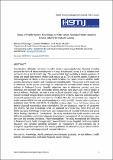| dc.description.abstract | Globally, new born mortality remains unacceptably high. Neonatal mortality
accounts for 60% of infant mortality rate in Kenya. In Makueni County, 1 in 22 children does
not live to his or her first birth day. This unacceptable high mortality is despite existence of
cheap and tested interventions which could reduce up to 70% of current deaths. Evidence of
mismanagement of clients in the County health facilities has raised concerns whether health
workers attending to mothers and neonates are knowledgeable. The purpose of this study was
to determine health worker knowledge on maternal and neonatal health related to service
delivery in Makueni County. Specific objectives were to determine prenatal care, preeclampsia
and postnatal care knowledge among primary care givers and how it relates to
service delivery. Methods: we used a cross sectional research design. A total of 163 health
workers selected through simple random sampling were involved. Data was collected using a
structured questionnaire and observational checklist. Results: On prenatal care, majority of
health workers 89(54.6%) had good knowledge (X2 =45.1 p<0.05). Practice didn’t conform to
guidelines since 30.3% and 69.7% of antenatal mothers didn’t have full history taken and
general physical examination done respectively. On pre-eclampsia, majority of caregivers
(78, 49.4%) had poor knowledge while on postnatal care 53(32.5%), 58(37.4%) and 132
(80%) had good knowledge in new-born care, management of neonatal infections and young
infant feeding respectively. Conclusions: The study concluded that health workers were not
following guidelines and lacked adequate knowledge in management of pre-eclampsia, newborn
care and neonatal infections. Recommendations: The study recommends the following
to Makueni County health managers (i) to have refresher course, targeted continuous medical
education and standard operating procedure on management of pre-eclampsia (ii) to
strengthen supportive supervision and ensure guidelines are adhered to (iii) to retrain workers
on new-born care and management of neonatal infections | en_US |

